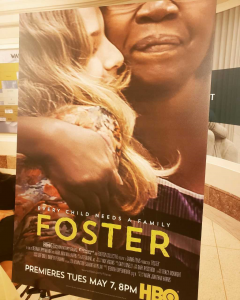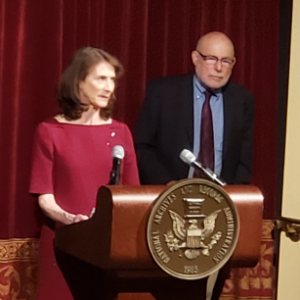FOSTER offers unflinching but uplifting look at child welfare system

Movie poster
The HBO documentary “FOSTER” takes viewers inside the sprawling Los Angeles foster care system and offers an unflinching, disturbing but ultimately uplifting look at the people who experience it.
This includes children and teenagers who have been victims of abuse, neglect and trauma; a new mother trying to overcome addiction so she can regain custody of her baby; and a foster parent, social workers, lawyers, advocates and judges who are trying to help them.
The documentary from Oscar-winning director and writer Mark Jonathan Harris and producer Deborah Oppenheimer, begins airing on HBO on May 7.
National Association of Social Workers (NASW) staff attended a special screening of the film at the National Archives in Washington, D.C. on April 30. NASW strongly recommends social workers and their allies take time to watch the film.
In order to make the documentary Harris and Oppenheimer spent years meeting with people involved with the Los Angeles County Department of Children and Family Services.
There are more than 400,000 children in foster care in the United States and the number is growing, partly because of an opioid addiction epidemic sweeping the nation. However, the filmmakers noted Los Angeles is the largest child welfare system with the nation, receiving more than four million calls of suspected child abuse and neglect each year.
Learn more about the documentary “FOSTER” and how you can organize a watch party
The film shows the moving stories of young people such as Mary and Dasani. Mary’s mother was abusive and she and her siblings were put in foster care. She has been moved from home to home and is now in college and struggling to be independent.

Filmmakers Deborah Oppenheimer and Mark Jonathan Harris at the National Archives screening.
Dasani’s mother was murdered in front of him by a boyfriend the teenager considered his father. Struggling with the emotional impact of this trauma, Dasani gets into minor scraps in the group homes where he lives and ends up in court supervision.
Then there is Earcylene Beavers, a wise, warm but no-nonsense foster mother who has taken in hundreds of children of all races and physical abilities. “Once a child is taken from their parents if they didn’t have an issue then then they have an issue now,” she says.
Social workers play a key role in the documentary. For instance Randy Gracia, CSW, helps Mary and her sister when they get their first apartment. Jacqueline Chun, MSW, an emergency response children’s social worker, scrambles to make sure a newborn infant will go to a safe home when the mother’s blood test come back positive for narcotics.
And then there is Jessica Chandler, MSW, who grew up in foster care after her parents divorced and her mother became mentally ill and could no longer care for her or her siblings. Chandler now works as a child welfare social worker and advocates for children and teens in foster care.
“I don’t want to throw away the child welfare system,” Chandler said. “I want to restructure it.”
Child welfare social workers serve some of the most vulnerable children, youths, and families. Social workers specialize in building on the strengths of families and helping them to provide a safe and nurturing environment for children and youths. However, when families are unable to do this, social workers must intervene to protect the children from harm. To learn more, visit the National Association of Social Workers HelpStartsHere.org website.
| Leave A Comment
Advertisement
Leave a Comment
You must be logged in to post a comment.


